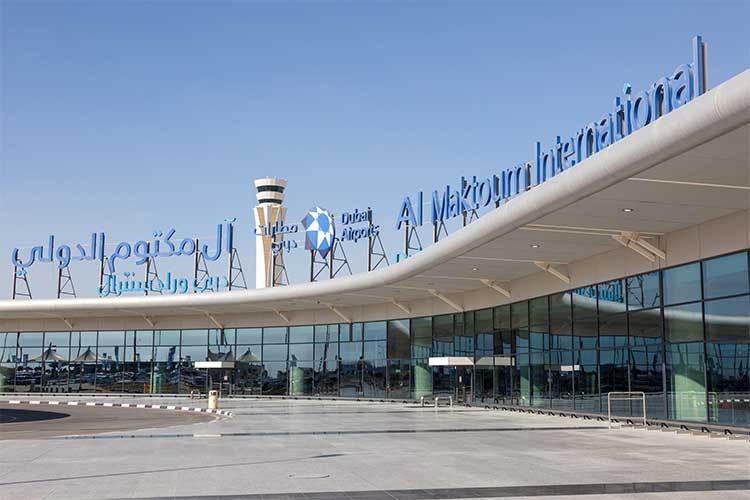

Experts weigh in on the boom that the real estate sector will experience on the expansion of the Al Maktoum International Airport in Dubai
July 08, 2024 | Deepa Natarajan Lobo | UAE | Developers

Always emerging as one of the world’s busiest airports every year, the Dubai International Airport (DXB) witnessed an impressive influx of 86.9 million passengers in 2023. However, the Al Maktoum International Airport (AMIA) on the outskirts of the city is all set to replace DXB in the coming years and take the emirate one step closer towards its economic agenda of D33 of attracting Dh100 billion in tourism investments.
The expansion work at AMIA is going on in full swing and the airport is expected to be five times the size of DXB with five runways, five passenger terminals, and over 400 aircraft gates. Moreover, the Dubai Aviation City Corporation recently announced the commencement of Phase Two expansion. The cornerstone of this ambitious endeavour is the development of a cutting-edge Dh128-billion passenger terminal, which is projected to catapult the airport's capacity to a remarkable 260 million passengers annually.
Sheikh Mohammed bin Rashid Al Maktoum shared on social media platform X that the development of an expansive city around Dubai's upcoming airport will provide employment and housing opportunities for up to one million individuals. “It will host the world’s leading companies in the logistics and air transport sectors,” he said. “We are building a new project for future generations… Dubai will be the world’s airport, its port, its urban hub, and its new global centre,” he added.
Coupled with the transformation of the Expo 2020 site into Expo City Dubai, the expansion is supposed to have a significant impact on the real estate landscape of the area. REM TIMES speaks to industry insiders to know more on the impact of the world’s most expensive airport on Dubai’s property market and how it will further cement the emirate’s position as the world’s leading international hub.
A New Milestone
Laura Adams, Secondary Director at Provident Estate, a UAE-based real estate organisation, points out, “The ambitious project aligns with Dubai's vision to create an innovative and sustainable community, driving up property values. With 80% of Expo structures set for reuse, the area will witness increased demand, translating into attractive investment opportunities. For instance, properties like a two-bedroom apartment in The Pulse and a four-bedroom townhouse in Emaar South, Expo Golf Villas, offer compelling options starting at AED 720,000 and AED 2,350,000 respectively.”
The project boosts connectivity and accessibility for global travellers and presents significant opportunities for Dubai’s real estate market. As the city’s infrastructure adapts to increased passenger influx, we foresee a surge in demand for properties.
PNC Menon, Founder & Chairman of Sobha Realty
Emirates Airline has already pledged its allegiance to AMIA designating it as its future hub. Vibrant visuals showcasing the forthcoming facilities underscore the airline's confidence in AMIA's potential to redefine air travel in the region and beyond.
Keeping all these factors in mind, PNC Menon, Founder & Chairman of Sobha Realty, a leading real estate firm, affirms that the expansion will mark a new milestone for Dubai’s aviation and economy. “With its capacity and vision, the expansion solidifies Dubai’s position as a global aviation hub, further driving economic growth. The project boosts connectivity and accessibility for global travellers and presents significant opportunities for Dubai’s real estate market. As the city’s infrastructure adapts to increased passenger influx, we foresee a surge in demand for properties,” he says and adds, “Dubai’s investment in aviation not only enhances competitiveness but also fuels growth across various sectors, including real estate. We applaud this ambitious initiative and pledge continued support for Dubai's prosperity and development.”
Svetlana from Metropolitan Homes gives a breakdown of the potential effects of the airport expansion –
High Returns
The relocation of Dubai International Airport to Al Maktoum International Airport will have a positive impact on property prices, with high returns on investment, particularly in Dubai South and its surrounding areas, believes Svetlana Vasilieva, Head of Secondary Sales at Metropolitan Homes, a prominent brokerage undertaking. “A gradual rise in property prices can be expected within the year, potentially reaching 10-15%. This initial increase may be driven by anticipation of future growth. Investors have already noticed a significant rental price increase of 29% in Dubai South according to Property Monitor’s report on average residential rental prices (2023 vs 2024),” she reveals. “A more significant price increase is likely closer to the completion of the new passenger terminal at Al Maktoum International Airport. This is when the full impact of the airport’s expansion and business activity becomes more tangible,” she adds.
Despite potential challenges such as increased traffic congestion and noise pollution, which could influence property values, the expansion of AMIA is likely to stimulate economic growth, infrastructure development, and job creation in the surrounding areas, all of which are conducive to a thriving real estate market.